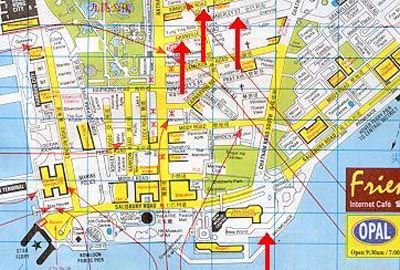I read SS's article "Tai Ping San Ha," or "Under Mount Victoria" with a great deal of interest. During the late 60's and 70's, I received the oversea version of Taiwan's "Central Daily." In that, people often wrote about U.S. after visiting one place for a few days, then proclaimed, "This is America" Initially, I read them with bemusement. Later I realized that it is those who freshly coming to U.S. can see the different life styles, whereas if you stayed in the country for few years and visited many places, you begin to get numb or lost the sight for what you have seen. There is a Chinese saying that if you stay in a stinking place for a while, you will not smell the stench. Or if I stay in the Flagrance Harbor for a while, I will not smell the flagrance.
Now, I happened to live in TsimShaTsui where Prof. SS wrote about. I have not been there long enough for me to become oblivious what Prof. SS saw, but long enough for me to figurer out the reasons (at least I think so).
First regarding he got lost in the "maze." Hong Kong is a small place. From Canton Rd to Chatham Road (across the whole TsimShaTsui at Cameron Rd) it is only 0.4 a mile-less than 30 seconds if you are on freeway in U.S. If the streets are all straight, and at right angle to each other (Manhattan pattern), you can see clearly from one end to the other. To make it looks bigger, they put a lot of bends or zigzags in the streets. If you get lost in between, you would naturally think it is big. TsimShaTsui East is a "recent" addition-all streets are set at 45 degrees to streets of TsimShaTsui. Even better, except three major streets, all the streets have no name. If you can see and walk towards the ocean, you will be either walking towards the TsimShaTsui or away from it towards Hung Hom. If that do not get you get lost there, nothing will.
Right now I live in the New World Apartment at the eastern tip of TsimShaTsui. The first thing you notice is that the building has a lot of bends. Then there are a lot of turns and bends before you can even come into our apartment bldg. When you step into the doors of our apartment building, if you can still identify which way is the Victoria Harbor, a dinner is on me (only apply to those who do not live in HK). Incredible? Incredible! However, I will buy you a dinner regardless-I am glad to see you in HK.
Then, he commented on being greeted with English while somebody sat down at his table. He wonder if that person took him as a "Lo Tao---unfashionable" way of dressing, or an "Ah Bak---old guy from the US," or even a "bill shuk---distance uncle from the mainland". No, no, no, no, it is not because how he dressed, or looked, though people in HK consider most Chinese Americans dress and look like country bumpkins. Nobody in HK would address a "Lo Tao" or a "bill shuk" in English. They will talk Cantonese to "Lo Tao" and accented Mandarin to "bill shuk." And I think SS's wife, who always looks impeccable, believe was with him, would not make SS looked like "Ah Bak." It is a simple custom in Hong Kong that when you "infringe" on somebody, you use English. You never hear "Dui Mg Tsu" but "Sorry" or "Excuse me" when somebody cuts in front of your (while walking), bumps into you, steps on your foot, or sits down at your table "intrudes" into your personal space.
Believe this is for two reasons. Being shorter to say is not one of them as "Excuse me" is a phrase with three syllabuses. Asians, and Chinese in particular, are loath to apologize for face saving reasons. However, when we say "sorry" in English, it is less personal than saying "Dui Mg Tsu" in Cantonese. It is like many Chinese Americans feel awkward to say "I love you" in Chinese to their loved ones, but no problem in English. The same is for apology. Similarly, Japan still has not apologized for their wrong doings to their WWII atrocities in China.
Then, speaking English conveys a "respect" for both the speaker and audience in Hong Kong. English is for "high class" Chinese in HK. Lest they consider you are a Philippino, one is flattered if one is addressed in English in HK. And the speaker is accorded respected if he speaks English. When someone sits down at your table and asks, "May I sit here?" he is acting like a gentleman and is treating you with respect. How can you refuse?
Now to make a place look bigger, another method is to use mirrors. You have mirrors everywhere in Hong Kong. There are mirrors in hotel lobbies, in room closets, in "flyovers," in "subways" (not MTR), in lifts (elevators), in shopping malls, in restaurants, in most of stores and in their display cases. I recently found that with two mirrors at a corner, you see a "photo" image of yourself instead of "mirror" image of yourself. That is, if you hold up a newspaper in front of two mirrors at 90 degrees to each other, you can read it, instead of left-right "reversed." I am very happy to find out that as an old dog still learned a new trick in HK. On the other hand, possibly all the Lighters knew this when they were still in Pui Ching. Guess it is always better to be "ho tsi ho ko" than "ba tsi ba ko." If my Cantonese befuddles you, I try to say, "It is better late than never."


|


![]()
![]() Get
your own Free Home Page
Get
your own Free Home Page